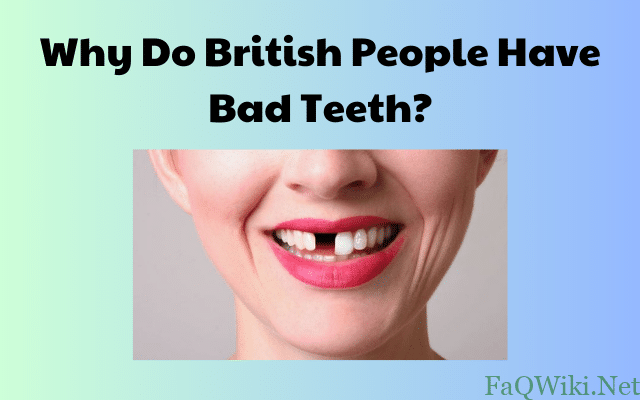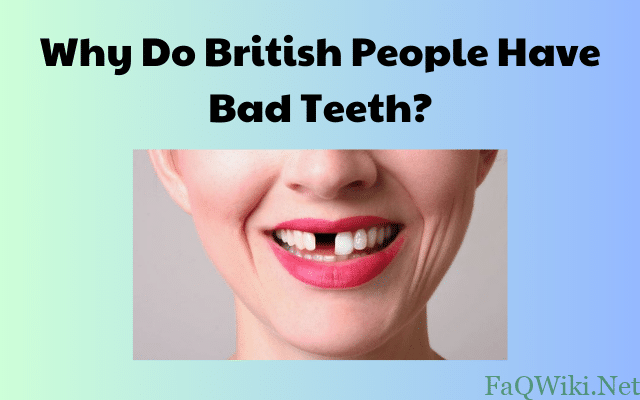Why Do British People Have Bad Teeth? The Truth Behind the Stereotype

As the old joke goes, “Why do British people have bad teeth? Because they don’t like to brush them!” While this stereotype has been the subject of many jokes, the reality is that dental health in the United Kingdom is a serious issue. In fact, a survey conducted by the British Dental Association found that one in three adults in the UK has tooth decay.
So, why do British people have bad teeth? In this article, we will explore the cultural, historical, dietary, lifestyle, and access to care factors that contribute to this issue. We will also discuss the importance of dental health, and possible solutions for improving dental care in the UK.

Cultural and Historical Factors
The history of dental care in the UK has been marked by several key moments, including the establishment of the National Health Service (NHS) in 1948. While this was a major step forward for the country, dental care was not always included in the NHS’s coverage. This meant that many people were forced to pay for private dental care or go without treatment.
In addition, there has historically been a cultural stigma attached to dental health in the UK. Many people view dental care as a luxury or a cosmetic concern rather than a necessary aspect of overall health. This attitude has led to a lack of education and awareness about the importance of dental health.
Dietary Factors
Dietary factors play a significant role in dental health. In the UK, the average person consumes around 58 pounds of sugar per year, much of it in the form of sweets, fizzy drinks, and other sugary snacks. This high sugar intake contributes to tooth decay, as the bacteria in the mouth feed on the sugar and produce acid that erodes tooth enamel.
In addition, traditional British cuisines, such as fish and chips, bangers and mash, and sticky toffee pudding, is not particularly tooth-friendly. These foods are often high in fat, sugar, and carbohydrates, all of which can contribute to poor dental health.
Lifestyle Factors
Smoking is a significant risk factor for poor dental health, as it can lead to tooth discoloration, gum disease, and even oral cancer. In the UK, smoking rates have been declining in recent years, but they are still higher than in many other countries.
In addition, drinking habits in the UK can contribute to poor dental health. Binge drinking, in particular, can cause dehydration, which can lead to a dry mouth and an increased risk of tooth decay. Stress is another lifestyle factor that can impact dental health, as it can cause people to grind their teeth or neglect their dental care routine.
Lack of Access to Dental Care
Access to dental care is a significant issue in the UK, particularly for those who cannot afford private dental care. The NHS provides dental care, but there are often long waiting lists for appointments, and many people are forced to go without treatment. In addition, dental care is not always a priority for the NHS, which can lead to a lack of funding and resources for dental services.
Misinformation and Lack of Education
There are many myths and misconceptions about dental care in the UK, which can contribute to poor dental health. For example, some people believe that brushing their teeth too hard can damage their enamel, or that flossing is unnecessary. In addition, many people lack education about the importance of dental health and how to properly care for their teeth.
The media also plays a role in promoting misinformation about dental care. Advertisements for sugary snacks and drinks are common in the UK, and they often portray dental health as a cosmetic concern rather than a necessary aspect of overall health.
The Importance of Dental Health
Poor dental health can have significant consequences for overall health. Dental problems can lead to chronic pain, difficulty eating and speaking, and even systemic health issues like heart disease and diabetes. In addition, poor dental health can have social and economic consequences, as people may feel self-conscious about their appearance and struggle to find employment due to dental issues.
It is important for individuals to prioritize their dental health by brushing and flossing regularly, consuming a balanced diet, and avoiding smoking and excessive alcohol consumption. Regular dental check-ups are also important for identifying and treating dental issues before they become more serious.
Possible Solutions for Improving Dental Care in the UK
Improving access to dental care is a key step in addressing the issue of poor dental health in the UK. The government could allocate more resources to dental care within the NHS, ensuring that everyone has access to affordable and timely dental treatment.
Education and awareness campaigns could also help to combat the cultural stigma attached to dental health in the UK. By emphasizing the importance of dental health for overall health and well-being, people may be more likely to prioritize their dental care and seek treatment when necessary.
In addition, policies could be put in place to limit the marketing and sale of sugary snacks and drinks. This could include implementing a sugar tax or placing restrictions on the marketing of sugary products to children.
Conclusion
The stereotype that British people have bad teeth is not entirely without merit, as dental health in the UK is a serious issue. However, there is a variety of cultural, historical, dietary, lifestyle, and access to care factors that contribute to this issue.
Improving dental care in the UK will require a multifaceted approach, including improving access to care, increasing education and awareness about the importance of dental health, and implementing policies to limit the consumption of sugary snacks and drinks. By prioritizing dental health, individuals can improve their overall health and well-being, and reduce the negative social and economic consequences associated with poor dental health.
FAQs
What is the average cost of dental care in the UK?
The cost of dental care in the UK varies depending on the type of treatment and whether the patient is receiving treatment through the NHS or privately. NHS dental treatment is currently free for people under 18 and those who are pregnant or have given birth in the past year. For adults, the cost of NHS dental treatment ranges from £22.70 to £269.30.
How often should I go to the dentist?
The British Dental Association recommends that individuals visit the dentist at least once a year for a routine check-up and cleaning. However, people with certain dental issues, such as gum disease or a history of cavities, may need to visit the dentist more frequently.
Can poor dental health lead to other health problems?
Yes, poor dental health can lead to a variety of systemic health issues, including heart disease, stroke, and diabetes. This is because the bacteria that cause dental problems can enter the bloodstream and affect other parts of the body.
Are there any cultural reasons why British people have poor dental health?
Yes, there are cultural reasons why dental health may be less of a priority in the UK. For example, there is a cultural stigma attached to dental health in the UK, where having crooked or discolored teeth is often seen as a sign of working-class status. Additionally, the NHS’s historical focus on emergency dental care may have contributed to a lack of emphasis on preventative care.
What is the impact of poor dental health on employment opportunities?
Poor dental health can have a negative impact on employment opportunities, as people may feel self-conscious about their appearance and be judged unfairly by potential employers. In addition, dental issues can lead to chronic pain and difficulty eating and speaking, which can affect job performance.
Can a sugar tax really help to improve dental health?
Yes, a sugar tax could help to reduce the consumption of sugary snacks and drinks, which are major contributors to poor dental health. By making these products more expensive, people may be more likely to choose healthier alternatives, leading to overall improvements in dental health. However, it is important to note that a sugar tax alone is not a silver bullet solution and must be combined with other efforts to improve dental health.
